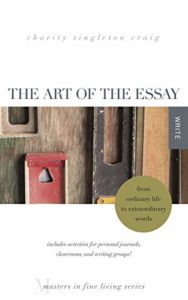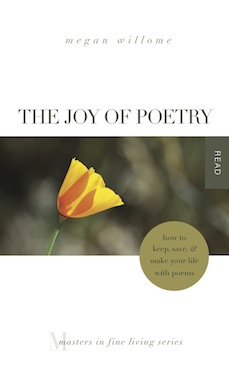Once something has been written, I’ve lost the ability to hold these words and thoughts and memories close.”
—Charity Singleton Craig
Why write? Essays or anything, really?

Our first two book club meetings looked at how to write essays. This final post is about why to write them.
Charity explores this subject in chapter 12, in which she asks, “Where do essays, with their big ideas and nuanced thinking, even fit in a culture that refuses to listen?” She then answers, “Our essays don’t just have meaning. They must mean something to us and to the world around us.”
Our essays must bear witness. They must be capital-T True. When we’ve finished writing, we may have written so truly that we feel a little true’d out, and that’s okay. There’s a loss, having released what we held so closely into the wide, wide world.
All my magazine columns expressed truth. Some of them were written with enough slant that they veered toward poetry. Only a few hit the True mark. For that kind of bravery, I needed to dive into the one creative genre most likely to reduce me to a puddle of simultaneous exhilaration and weepiness: musicals, in this case, Wicked.
My May 2011 column For Good, just in time for Mother’s Day, still moves me deeply (even though I don’t think it’s my best writing) because it’s about me, my mother, and my daughter. It’s capital-T true. At the time I wrote it I hoped it would mean something to the sizable population of the world that a) has a mother, b) has a daughter, c) loves The Wizard of Oz. I considered the timeless questions the musical asks: What does it mean to be wicked? To be popular? To be a friend?
“This is how we move from speculation past narcissism towards embodied critical thinking,” Charity writes. “This is how we stand by words.”
Because this essay is now eight years old, I reread it with knowledge that then-Megan could not know about her future. I stand by every word.
Write With Us
“An essay is an attempt — when I learned that, it was so liberating!” Charity told me.
You have one more attempt at writing something True. Think about your particular nexus of passion — the issues or subjects or stories that move you deeply. How could one of them become an essay, one bigger than you? Put something good in the world, in fewer than 1,000 words. Link in the comments.
Photo by Sandrine Néel, Creative Commons, via Flickr. Post by Megan Willome.
Browse more book clubs with Charity Singleton Craig
“Megan Willome’s The Joy of Poetry is not a long book, but it took me longer to read than I expected, because I kept stopping to savor poems and passages, to make note of books mentioned, and to compare Willome’s journey into poetry to my own. The book is many things. An unpretentious, funny, and poignant memoir. A defense of poetry, a response to literature that has touched her life, and a manual on how to write poetry. It’s also the story of a daughter who loses her mother to cancer. The author links these things into a narrative much like that of a novel. I loved this book. As soon as I finished, I began reading it again.”
—David Lee Garrison, author of Playing Bach in the D. C. Metro
- Perspective: The Two, The Only: Calvin and Hobbes - December 16, 2022
- Children’s Book Club: A Very Haunted Christmas - December 9, 2022
- By Heart: ‘The night is darkening round me’ by Emily Brontë - December 2, 2022



Leave a Reply